Innovation dialogue on the introduction of water lentils as an ecological and plant-based protein alternative in Brazil

Initial situation:
- The globally dominant cultivation and production methods for obtaining animal and vegetable protein are not sustainable.
- In the past, the cultivation of commodities (e.g. soya) has led to severe deforestation in the Amazon, among other things.
- Small and medium-sized farmers in north-east Brazil play a subordinate role in the cultivation of commodities, but are severely affected by climate change and are increasingly having to abandon their farms.
Project content:
Duckweed has been used for thousands of years to obtain protein, but has since been forgotten. A few years ago, it was rediscovered as a source of protein, especially in animal feed, and as a supplement to soya. This makes it ideal for smallholder production, even in non-agricultural favourites that are already severely affected by climate change. In this way, duckweed can provide farmers in these areas with an alternative source of income.
The semi-arid north-east of Brazil is well suited to the cultivation of duckweed: The high solar radiation guarantees high productivity rates. The duckweed is also relatively tolerant of the often high salinity of the groundwater in this region. As part of the Innovation and Transformation Dialogue (ITD), e.g., small-scale fish ponds are being set up here and duckweed is being introduced as a source of protein for feeding fish. In addition, the smallholder farmers receive technical advice and scientific support.
The duckweed ITD combines the development policy approach of rural poverty reduction with an ecologically and climatically sensible expansion of the production of vegetable proteins. The duckweed value chain is a relatively new value chain in Brazil: production and utilisation as animal feed need to be further researched. In addition, it is planned that the entire value chain will remain in the hands of small farmers, not only by expanding primary production, but also by supporting processing and marketing. This will also improve the local and regional food situation through diversification.
Implementer:
The project is being implemented by IAK Agrar Consulting GmbH. On site, IAK is working with the Pernambucan agricultural research institute IPA and the local municipality of Mirandiba.
